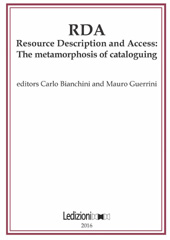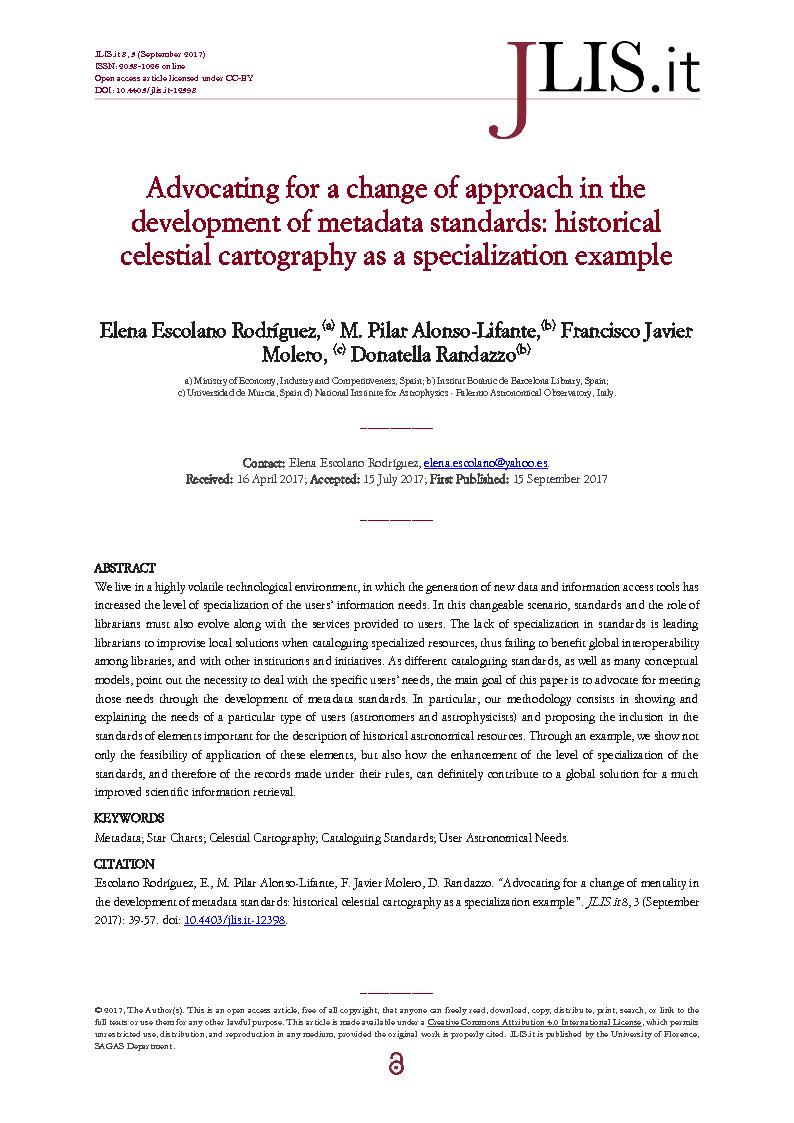Advocating for a change of mentality in the development of metadata standards : historical celestial cartography as a specialization example
39-57 p.
Viviamo in un contesto tecnologico estremamente mutevole, nel quale la creazione di nuovi strumenti di accesso a dati e informazioni ha incrementato il livello di specializzazione delle necessità informative degli utenti. In tale variabile scenario, anche le norme e il ruolo dei bibliotecari devono trasformarsi assieme ai servizi forniti agli utenti. L'assenza di standard specifici ha spinto i bibliotecari a improvvisare soluzioni locali nella catalogazione di risorse specialistiche, con il conseguente venir meno dei benefici legati all'interoperabilità globale tra le biblioteche e con altri istituti e iniziative.
Dal momento che differenti standard di catalogazione, e altresì numerosi modelli concettuali, segnalano la necessità di affrontare specifici bisogni degli utenti, il primo scopo di questo contributo è di sostenere il soddisfacimento di tali necessità nello sviluppo degli standard di metadatazione. In particolare, la nostra metodologia consiste nell'esporre e chiarire i bisogni di una particolare categoria di utenti (astronomi e astrofisici) e proporre l'inserimento negli standard di elementi importanti per la descrizione delle risorse astronomiche. Tramite uno specifico esempio, mostreremo non solamente la possibile applicazione di questi elementi, ma altresì come il miglioramento del livello di specializzazione degli standard, e di conseguenza dei record realizzati sulla base delle loro norme, può certamente contribuire a una soluzione globale per un migliore reperimento dei dati scientifici. [Testo dell'editore].
We live in a highly volatile technological environment, in which the generation of new data and information access tools has increased the level of specialization of the users' information needs. In this changeable scenario, standards and the role of librarians must also evolve along with the services provided to users. The lack of specialization in standards is leading librarians to improvise local solutions when cataloguing specialized resources, thus failing to benefit global interoperability among libraries, and with other institutions and initiatives.
As different cataloguing standards, as well as many conceptual models, point out the necessity to deal with the specific users' needs, the main goal of this paper is to advocate for meeting those needs through the development of metadata standards. In particular, our methodology consists in showing and explaining the needs of a particular type of users (astronomers and astrophysicists) and proposing the inclusion in the standards of elements important for the description of historical astronomical resources. Through an example, we show not only the feasibility of application of these elements, but also how the enhancement of the level of specialization of the standards, and therefore of the records made under their rules, can definitely contribute to a global solution for a much improved scientific information retrieval. [Publisher's Text].
-
Articoli dello stesso fascicolo (disponibili singolarmente)
-
Informazioni
Codice DOI: 10.4403/jlis.it-12398
ISSN: 2038-1026
PAROLE CHIAVE
- Metadata, Star Charts, Celestial Cartography, Cataloguing Standards, User Astronomical Needs



